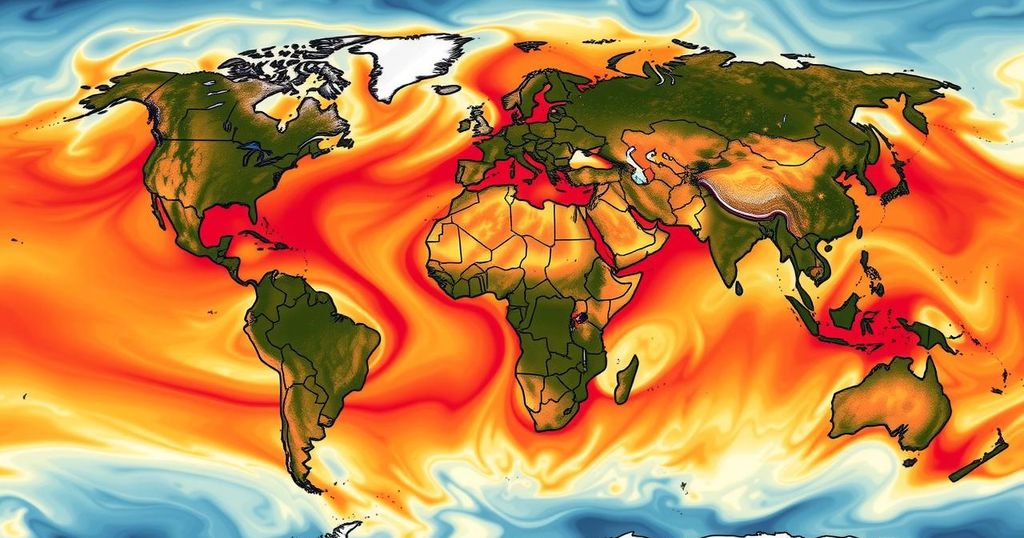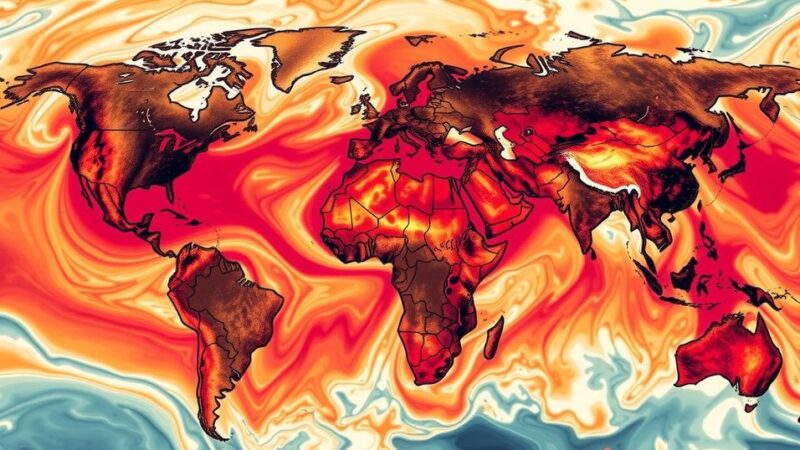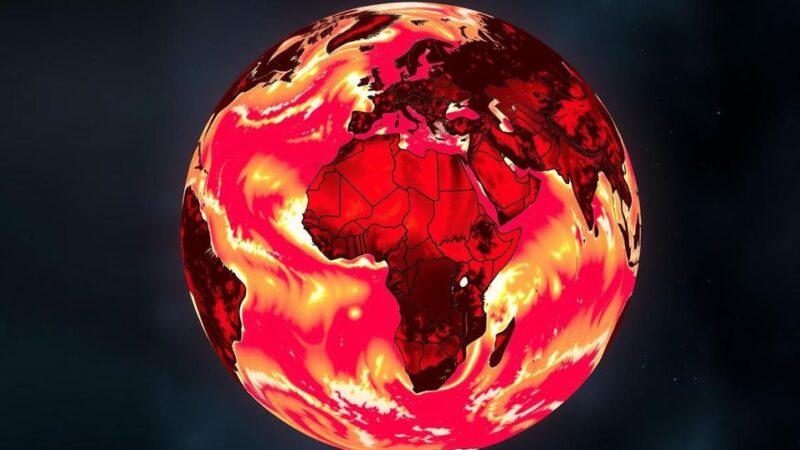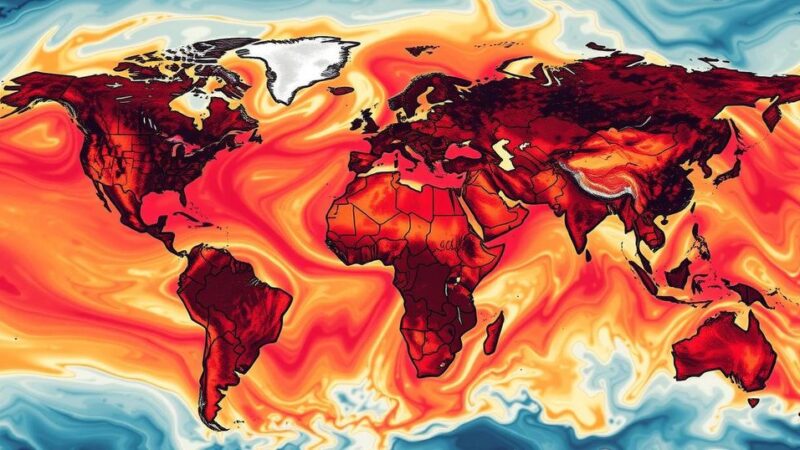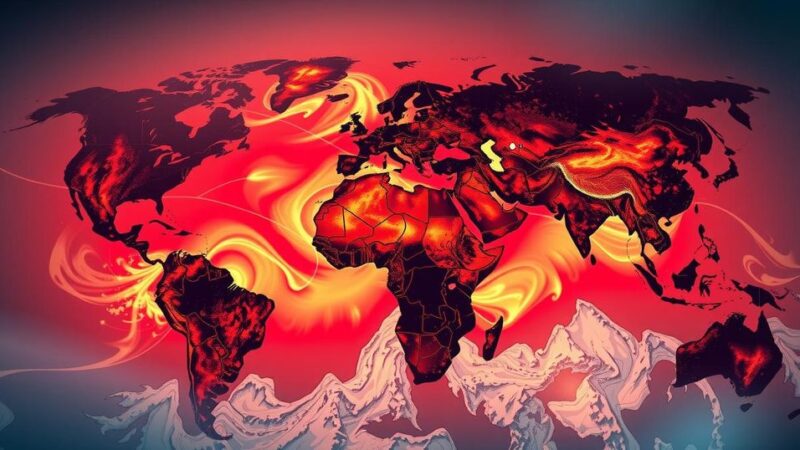In 2024, global temperatures rose to a record 1.6°C above preindustrial levels, surpassing the 1.5°C limit set by the Paris Agreement for the first time. Driven by fossil fuel emissions, the resulting extreme weather events caused extensive human suffering. Urgent actions are required to transition away from fossil fuels, especially as emissions are projected to reach record highs, jeopardizing future climate stability.
In a significant climate milestone, 2024 marked the first year in recorded history where global temperatures exceeded the 1.5°C threshold set by the Paris Agreement. Data from the European Union’s Copernicus Climate Change Service reveals an alarming average temperature rise of 1.6°C above preindustrial levels, a sharp increase from the previous record set in 2023. This escalation is primarily attributed to fossil fuel combustion, highlighting the urgent need for a transition to renewable energy sources to mitigate damages to lives and ecosystems globally.
The year was characterized by unprecedented weather anomalies, with a staggering 44% of the Earth exposed to extreme heat on July 10, 2024, and the hottest day recorded on July 22. Scientists have reiterated that the increasing global temperatures and elevated atmospheric water vapor levels have resulted in extreme weather patterns, resulting in widespread human suffering. Dr. Samantha Burgess of C3S cautioned that the likelihood of surpassing the Paris Agreement’s long-term temperature limits is remarkably high, indicating that climate emergencies are intensifying globally. Furthermore, Dr. Friederike Otto from Imperial College London stressed the urgency of acknowledging the realities of extreme weather conditions that manifested in various disasters last year, such as the floods in Valencia and hurricanes in the USA.
Despite anticipated record-high carbon emissions in 2024, nations continue to grapple with the essential transition away from fossil fuels that was pledged at the UN climate conference. Projections indicate a potential catastrophic increase of 2.7°C in global temperatures by the century’s end if current trends persist. Global efforts need to expedite emissions reduction commitments, with a crucial opportunity for nations to present new pledges to the UN in February. While natural phenomena like El Niño contributed to early-year temperature rises, concerns are mounting that unanticipated factors may be exacerbating global warming rates. Moreover, the increase in water vapor not only promotes heavier rainfall and flooding but also amplifies the intensity of climatic events.
With fundamental changes required to prevent further damage and ensure long-term resilience, experts underscore the declining costs of renewable energies as a viable alternative to fossil fuels. As noted by Professor Joeri Rogelj from Imperial College London, every increment in temperature leads to deeper harms for people and ecosystems, necessitating immediate and ambitious measures to curtail emissions.
Finally, climate scientist Professor Andrew Dessler emphasized the alarming trend of successive record-breaking temperatures, suggesting that forthcoming years may only compound the severity of climate impacts experienced worldwide.
The article discusses a critical year in climate history, where data indicated that global temperatures surpassed the 1.5°C threshold, a key target established by the Paris Agreement to combat climate change. The analysis from the Copernicus Climate Change Service underscores the contribution of fossil fuels to rising temperatures and highlights significant impacts such as extreme weather events affecting millions. This context illustrates the critical state of global climate efforts and the urgent need for radical action to transition from fossil fuels to renewable energy sources. The data collected reveals not only the temperature increase but also the serious implications for ecosystems and human livelihoods around the planet, orienting the discussion toward immediate governmental and societal responses to climate emergencies.
In conclusion, the surpassing of the 1.5°C threshold in 2024 serves as a stark wake-up call regarding the escalating climate crisis, underscoring the urgent need for global action to curb carbon emissions and transition to renewable energy. Record temperatures and extreme weather events have profound implications for humanity, stressing the imperative for countries to enhance their commitments to emissions reductions. The continuity of climate extremes will persist unless decisive measures are taken, marking 2024 as both a historic and pivotal moment in our environmental stewardship.
Original Source: www.theguardian.com

